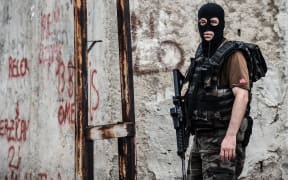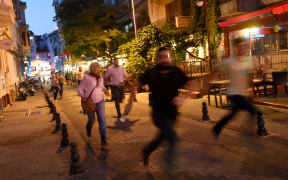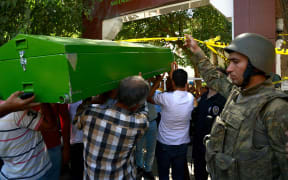Two explosions at a peace rally in the Turkish capital Ankara have killed at least 97 people in the deadliest attack of its kind in recent Turkish history.
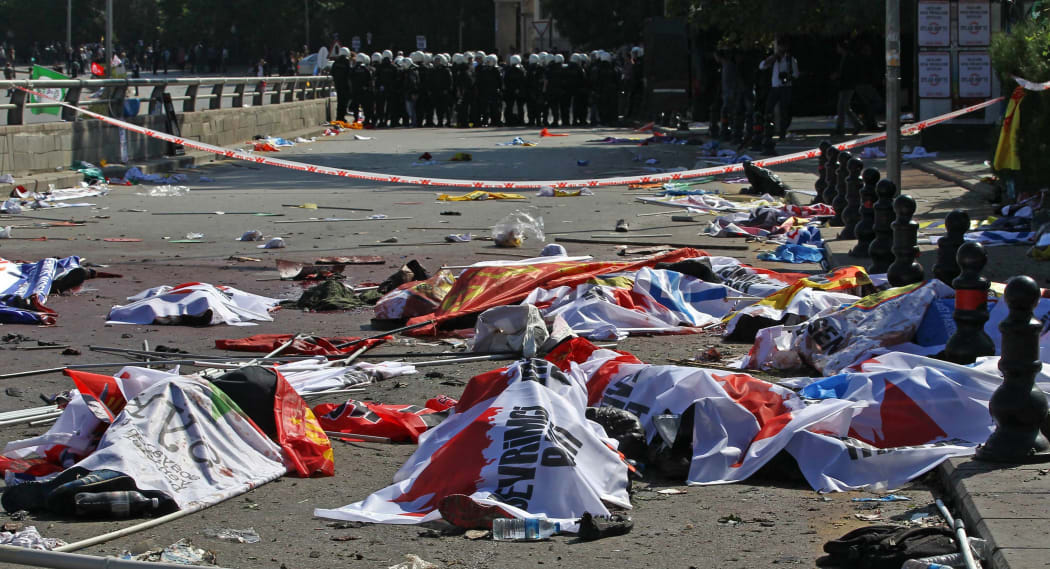
Victims' bodies draped with banners and flags at the site of the deadly explosions in Ankara. Photo: AFP
The death toll is likely to rise. The Turkish government says 245 people were wounded, and more than 40 of them are in intensive care.
TV footage showed scenes of panic and people lying on the ground covered in blood, amid protest banners.
The government has announced three days of national mourning.
The blasts took place near the city's central railway station as people gathered for a march organised by leftist groups, just weeks before elections.
Young pro-Kurdish and labour activists were holding hands and singing songs when the two bombs went off.
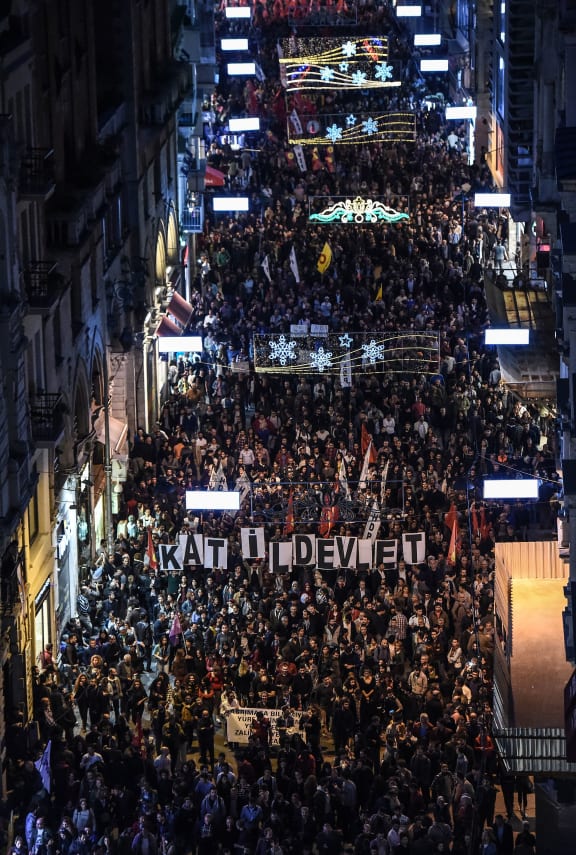
Thousands march along Istiklal Avenue in Istanbul in protest against the Ankara attack. Photo: AFP
Bulent Tekdemir, who was at the rally, told the BBC that the police used tear gas "as soon as the bomb went off", and "would not let ambulances through".
The leader of the pro-Kurdish HDP party has blamed the state for the attack, and cancelled all election rallies.
The HDP was among those calling for Saturday's rally for "peace and democracy". It was due to start at 12pm local time.
The party tweeted that there were "numerous dead and injured", and that police "attacked" people carrying the injured away.
Local resident Emre told the BBC that he heard two separate explosions and saw a number of dead bodies.
Angry people tried to attack police cars, he said.
The pro-Kurdish HDP party said in a statement that it believed its members were the main target of the bombings, and leader Selahettin Demirtas blamed the state for the attack.
Cancelling all election rallies, Mr Demirtas condemned the government as "murderers" and said it had blood on its hands.
The party has previously blamed the government for colluding in attacks on Kurdish activists, which the government denies.
Three days of mourning
Announcing three days of national mourning, the prime minister, Ahmet Davutoglu, urged the Turkish people to stand together.
He said his message was to every citizen - "irrespective of your political ideology, irrespective of your ethnic or religious background".
"Let us come together shoulder to shoulder and fight against terrorism."
Mr Davutoglu said there was evidence that two suicide bombers had carried out the attacks, which occurred within seconds of each other.
President Recep Tayyip Erdogan has described the attack, just three weeks before a re-run of June's inconclusive parliamentary elections, as "loathsome".
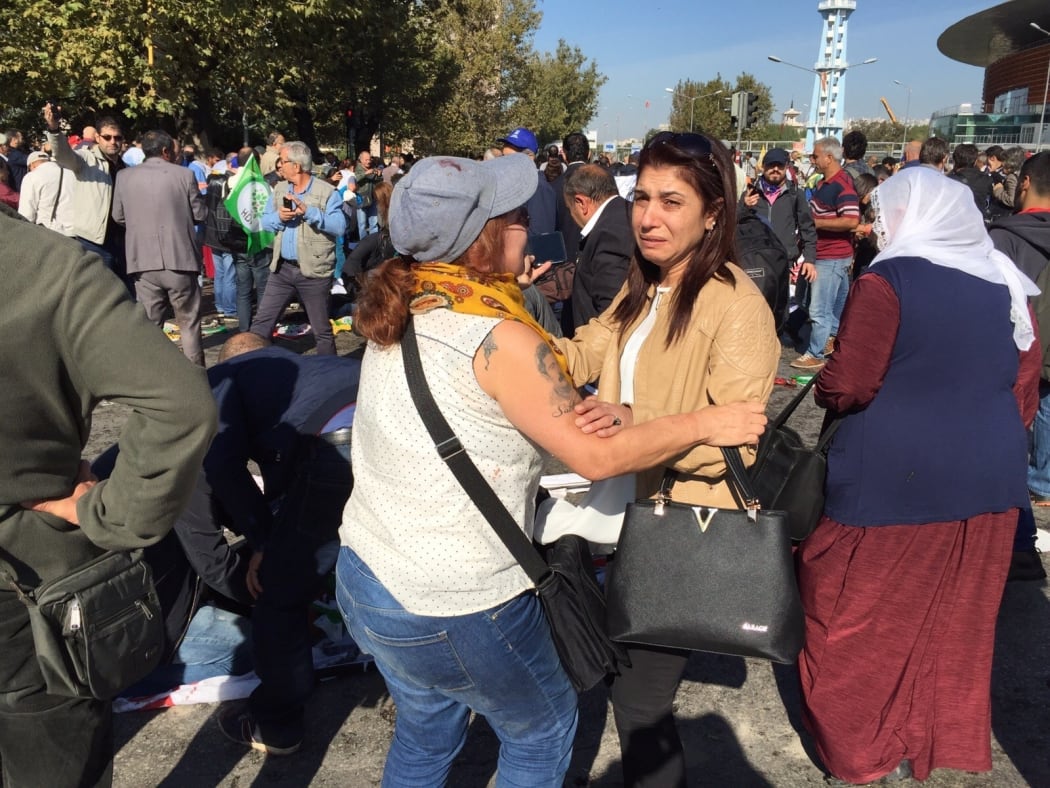
People at the site of the explosion. Photo: Anadolu Agency / AFP
The rally was demanding an end to the violence between the Kurdish separatist PKK militants and the Turkish government.
The violence had reignited after a ceasefire broke down earlier this year, with an increase in attacks from both sides over the summer.
On Saturday the PKK called on its fighters to halt its guerrilla activities in Turkey unless attacked first.
A statement from an umbrella group that includes the PKK said its forces would "make no attempts to hinder or harm the exercise of a fair and equal election".
The PKK has accused Turkey's security forces of collaborating with Islamic State.
Government blames 'terrorists'
Government officials said the blasts were a terrorist attack and they were investigating reports that a suicide bomber was behind at least one of the explosions.
An HDP rally in the city of Diyarbakir was bombed in June, ahead of general elections.
Turkey is holding another election next month, and a BBC correspondent in Istanbul said it was feared that another similar attack was imminent.
The HDP entered parliament for the first time in June's inconclusive elections.
A suicide bombing by suspected Islamic State militants on a gathering of Socialist youth activists in the town of Suruc on the Syrian border killed at least 30 people in July.
A ceasefire between the Kurdish militant group the PKK and Turkey's government later broke down, and there have been regular attacks from both sides since then.
- BBC
